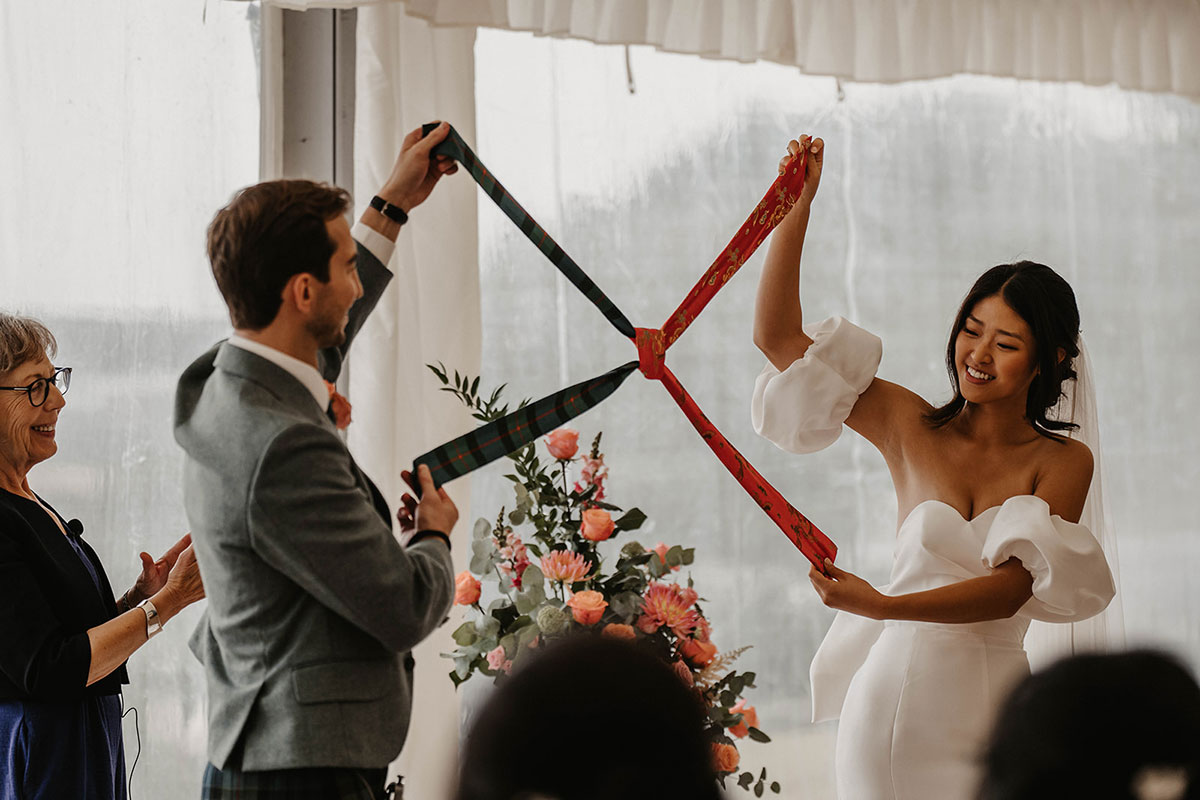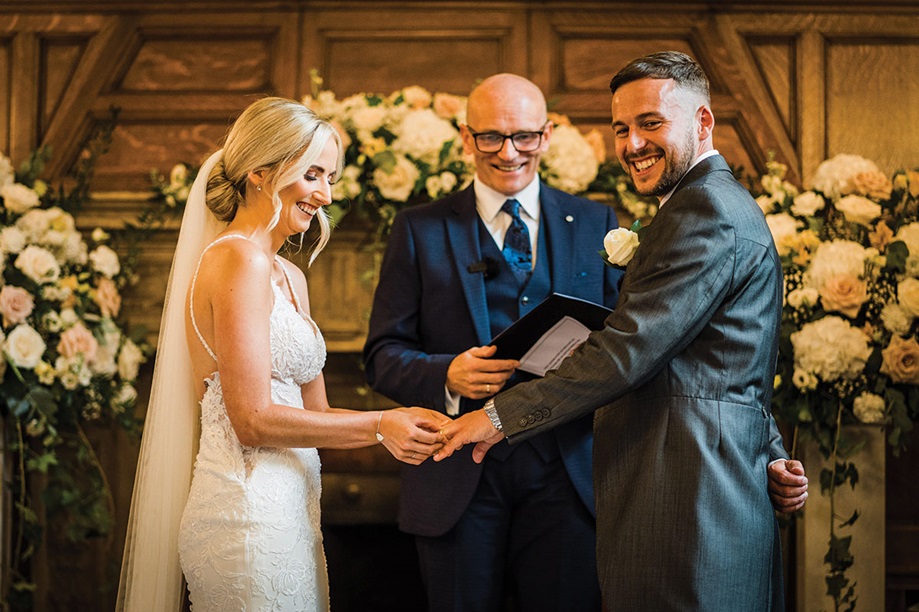Want to tell your loved one how you feel but just can’t find the words? These Scottish celebrants help you write amazing and personal vows for your wedding ceremony

George McLean at Fuze Ceremonies (Photo: Lifetime Photography)
Struggling to put your feelings into words when it comes to writing your wedding vows? We spoke to some brilliant Scottish celebrants to get their best advice on how to write your own wedding vows – and actually enjoy doing it.
1. Make sure you’re both up for it
Writing your own vows isn’t for everyone, and that’s okay. Craig Flowers from Independent Humanist Ceremonies says, “They should only be done if both parties are up for it, and although they can be a lovely addition, the wedding won’t be lacking in any way if you don’t make them a part of your ceremony.”
If you do decide that writing your own vows is the route you want to take, read on for more tips!
2. Start from the heart
Starting is often the hardest part of writing your own vows. Don’t worry about structure yet, just write down what comes to mind when you think about your partner and your relationship. Focus on why you love them and what makes your connection special. It doesn’t need to sound poetic or perfect – honest words always land best.
As George McLean at Fuze Ceremonies suggests, “It’s good to start with a little about why you love your partner, and then perhaps three or four promises you’d like to make to them that you’ll strive to keep throughout the marriage.”

Craig Flowers believes that writing personal vows is something both parties must agree on. "Don't pressurise anyone into doing something that's not for them," he says (Photo: Canvas and Peach)
3. Make real promises
Once you’ve got your feelings on paper, turn them into promises for the future. Think about what you’re committing to as a partner – being kind, supportive, patient, adventurous, or forgiving. Your vows should show how you’ll nurture your relationship, rather than recapping its history. Aim for three or four meaningful promises that reflect your values as a couple.
4. Agree on the length together
The last thing you want is one set of vows to sound like a novel while the other is over in ten seconds. Agree roughly how long they should be before you start writing.
Humanist celebrant Natalie Stevenson recommends, “It is easier to agree in advance a rough number of lines each. Then run them past your celebrant – that way they can check the word count and it’ll give an idea of how long the actual ceremony itself might last.”
Everything you need to know to plan a wedding ceremony in Scotland

Celebrant Beverley Bryant conducting a ceremony (Photo: Tommy Hamilton Photography)
5. Get feedback from your celebrant
If you’re struggling to write your vows, your celebrant can be a great sounding board. They can help refine the pacing, check the tone fits your ceremony style and make sure everything flows naturally when spoken aloud.
Hazel Sharp at Humanist Society Scotland says, “We’re more than happy to offer support, read over early drafts and keep you right. We’re here to help.”
6. Make them authentically you
Your vows don’t need to sound flowery or formal – they just need to sound like you. As Hazel puts it: “Suddenly coming over all ‘hearts and flowers’ when you’re usually all ‘beer and mountain bikes’ might not feel authentic. The more ‘you’ your personal vows are, the better they’ll feel.”

Scottish celebrant Paul Browett conducting a ceremony (Photo: Lou Rob Photo)
7. Don’t take content from online
It’s fine to read examples for inspiration, but resist copying someone else’s vows. As Craig adds, “Don’t trawl the internet pinching other people’s content – that defeats the purpose. These vows should be personal to you and your partner. Write them in your own language, with words that you are comfortable using.”
8. Stick to the point
Your vows aren’t a speech. Keep storytelling for the reception and focus instead on what you promise and wish for the future. “Sometimes people forget what the vows actually are and stray into the territory of saying what they would during the speeches,” says Natalie Stevenson.
Get inspired by these brilliant wedding readings
9. Don’t go too deep
Emotions will run high, but try not to make your vows too personal. “Avoiding really personal details will stop either of you getting worked up,” advises George at Fuze Ceremonies.
If you have something private to say, Tasha the Celebrant suggests a sweet alternative: “Write a letter to each other and open it together later in the day – you’ll still get that lovely heartfelt moment, with the ability to ugly-cry in private!”
10. Practice, not perfection
If the idea of saying your vows out loud fills you with nerves, practice is key. George advises: “Break down each set of words into small manageable chunks. Avoid any long and difficult-to-pronounce words that could catch you out.”
Don’t worry if you stumble over a line – as Natalie says, “We are all human and nerves can make it happen. Just take a pause, and you can say it again.”
And remember, you don’t need to memorise them. Most couples read from a card on the day. Stand tall, take a deep breath and, as Tasha reminds us, “Let loose, speak from the heart, and have the best time ever!”

George McLean at Fuze Ceremonies urgest couples to leave nerves at the door, "Everyone at your ceremony is on your side, including your soon-to-be husband or wife," he promises (Photo: Paul Budzinski Photography)
FAQs – Writing your own wedding vows
Writing your own wedding vows can add a deeply personal touch, but it’s entirely up to you. It works best if both of you feel comfortable doing it. As Craig Flowers from Independent Humanist Ceremonies notes, “The wedding won’t be lacking in any way if you don’t make them a part of your ceremony.”
The most important thing is that your vows and your partner’s vows are roughly the same length. If in doubt, aim for around 1 to 3 minutes or around 200-300 words per person. That ensures they feel meaningful without eating too much into the ceremony.
Yes. Humour can reflect your personalities, but balance it with sincerity so your vows remain heartfelt. Experts advise keeping jokes accessible to guests and avoiding overly private references.
No, it’s fine to read them from a prompt card. The key is confidence and clarity when speaking, not memorisation.
Practice beforehand by reading them aloud. You can also break the text into smaller chunks, avoid long, difficult words and use a prompt card. George at Fuze Ceremonies advises, “break down each set of words into small manageable chunks. Avoid any long and difficult-to-pronounce words that could catch you out.”




